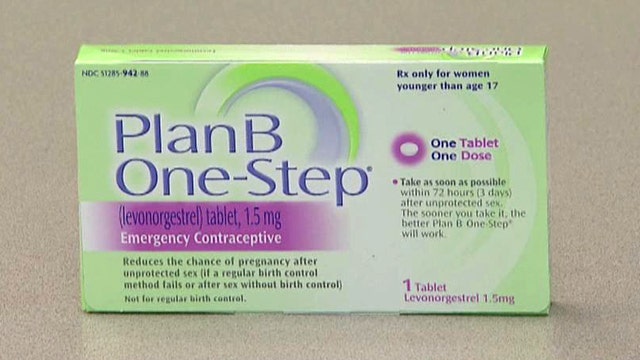Judge lifts restrictions on sales of 'morning after' pill
Julie Banderas reports on controversial ruling
In what has already shown to be a controversial move, a federal judge ruled Friday that the Food and Drug Administration must make the “morning-after” emergency contraception pill – also known as Plan B – available over-the-counter without a prescription for women of all reproductive age.
According to U.S. District Judge Edward Korman, from Brooklyn, N.Y., the FDA’s refusal to remove age restrictions on the pill has been “arbitrary, capricious and unreasonable.”
Currently, emergency contraception is only available without a prescription for women 17 and older. For women under the age of 17 who want the pill, they must first get a prescription from their doctor.
The ruling, seen as a victory for many reproductive-rights groups, already has many physicians divided. While some hail the move as a significant step towards reducing barriers for young women, others feel lifting age restrictions could lead to abuse of the drug, which can cause serious medical side effects.
According to Dr. Jennifer Landa, a hormone specialist and chief medical officer for BodyLogicMD, making emergency contraception available for young girls is sending the wrong message about pregnancy prevention and safe sex.
“Overall, it shows a lack of caution, if you ask me,” Landa told FoxNews.com. “Of course the prevention of unwanted pregnancy is a good thing. The problem is it encourages women to be more cavalier and not use more reliable birth control we’d like them to be using, including barrier methods that protect against sexually transmitted diseases.”
Landa also noted this could become a huge problem in lesser educated women, who may bypass birth control pills or IUDs altogether if they know this option is available to them.
On the other hand, some physicians feel that rather than promoting a “laissez-faire” attitude, lifting age restrictions will allow teenagers to get the medication they need in a more timely manner.
“The key with the morning after pill is that it’s taken as soon as possible after unprotected sex,” Dr. Lisa Perriera, a doctor in the department of obstetrics and gynecology for UH Case Medical Center, told FoxNews.com. “The way it is now, teens have to call a doctor, get a prescription, go to the pharmacy and then get the medication. Think about when you were 15 – those are a lot of steps. So most teens end up not getting it.”
With any medication sold over-the-counter, there is always potential for abuse and overuse. However, Perriera noted that the side effects are not very significant.
“There are side effects with every medication,” Perriera said. “The way this medicine is thought to work is that it prevents you from ovulating that month, so you don’t release an egg. If the egg gets released, you can still get pregnant. Overall, you may get irregular bleeding, mild nausea – but those are just minor effects.”
Conversely, Landa said it’s important not to downplay the side effects of this medication, as they can actually be quite concerning.
“The amount of progestin in Plan B One Step is 1.5 milligrams of levonorgestrel, which is much higher than the amount of progestin in birth control pills – which have already shown to have side effects,” Landa said. “And higher doses of progestin would of course have higher side effects.”
According to the manufacturers of Plan B One Step, side effects of the medication include nausea, lower abdominal pain, headaches, and changes in menstrual cycle.
“Menstrual changes is a big one, because (emergency contraception) can really throw off the woman’s cycle,” Landa said. “Women could come to really rely on this quite regularly, and then their period is going to be messed up for several weeks after doing this. Ultimately they’re not going to know if they’re pregnant or not.”
There are many other more serious well-documented side effects, Landa added, that come from overusing Plan B – including significant weight gain, depression, ovarian cyst enlargement, gall bladder disease, high blood pressure, and increased risk of ectopic pregnancy.
A main concern many doctors have revolves around the issue of age. With the potential for abuse and such side effects, are young women – essentially girls – really capable of understanding just what it is they are taking?
“This is a dangerous precedent,” said Dr. Manny Alvarez, senior managing health editor for FoxNews.com. “So you’re going to allow a 13-year-old child to be able to buy what once was a prescription regulated medication over the counter without any kind of restriction, any kind of parental advice. How is a child at the age of 13 going to be able to understand indication, usage and potential side effects?”
However, Perriera said young girls are more adept at understanding these medications than most think.
“There were thoughts about safety for teenagers and following instructions – needing more supervision,” Perriera said. “But there is lots of research that’s been done that shows teens can follow the instructions for this medicine.”
Overall, critics maintain that when it comes to any form of birth control, it’s important for women to educate themselves on the benefits and risks of taking hormone medication. And the best way to do that is to speak with a doctor.
“I think it’s really important for birth control to be individualized based on each woman’s medical history, her particular situation, and her risk,” Landa said. “And that needs to happen in a conversation with a health practitioner. Maybe even with a nurse….or at least speak with pharmacist – but that’s better than it sitting on the shelf.”









































